
Meeting Debian people for having a good time together, for some good hacking,
for learning, for teaching Is always fun and welcome. It brings energy, life
and joy. And this year, due to the six-months-long relocation my family and me
decided to have to Argentina, I was unable to attend the real deal, DebConf23 at
India.
And while I know DebConf is an experience like no other, this year I took part
in
two miniDebConfs. One I have already shared in this same blog: I was in
MiniDebConf Tamil Nadu in
India, followed by
some days of pre-DebConf preparation and scouting in Kochi proper, where I got
to interact with the absolutely great and loving team that prepared DebConf.

The other one is still ongoing (but close to finishing). Some months ago, I
talked with Santiago Ruano, jokin as we were Spanish-speaking DDs announcing to
the debian-private mailing list we d be relocating to around
R o de la
Plata. And things worked out normally: He has been for several months in
Uruguay already, so he decided to rent a house for some days, and invite Debian
people to do what we do best.
I left Paran Tuesday night (and missed my online class at UNAM! Well, you
cannot have everything, right?). I arrived early on Wednesday, and around noon
came to the house of the keysigning (well, the place is properly called Casa
Key , it s a publicity agency that is also rented as a guesthouse in a very nice
area of Montevideo, close to Nuevo Pocitos beach).

In case you don t know it, Montevideo is on the Northern (or Eastern) shore of
R o de la Plata, the widest river in the world (up to 300Km wide, with current
and non-salty water). But most important for some Debian contributors: You can
even come here by boat!

That first evening, we received Ilu, who was in Uruguay by chance for other
issues (and we were very happy about it!) and a young and enthusiastic
Uruguayan, Felipe, interested in getting involved in Debian. We spent the
evening talking about life, the universe and everything Which was a bit
tiring, as I had to interface between Spanish and English, talking with two
friends that didn t share a common language
On Thursday morning, I went out for an early walk at the beach. And lets say, if
only just for the narrative, that I found a lost penguin emerging from R o de la
Plata!

For those that don t know (who d be most of you, as he has not been seen at
Debian events for 15 years), that s Lisandro Dami n Nicanor P rez Meyer (or just
lisandro), long-time maintainer of the Qt ecosystem, and one of our embedded
world extraordinaires. So, after we got him dry and fed him fresh river fishes,
he gave us a great impromptu talk about understanding and finding our way around
the Device Tree Source files for development boards and similar machines, mostly
in the ARM world.
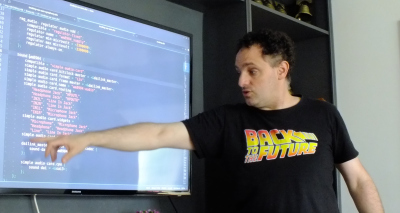
From Argentina, we also had Emanuel (
eamanu) crossing all the way from La
Rioja.
I spent most of our first workday getting my laptop in shape to be useful as
the driver for my online class on Thursday (which is no small feat people that
know the particularities of my much loved ARM-based laptop will understand), and
running a set of tests again on my
Raspberry Pi labortory, which I had not
updated in several months.
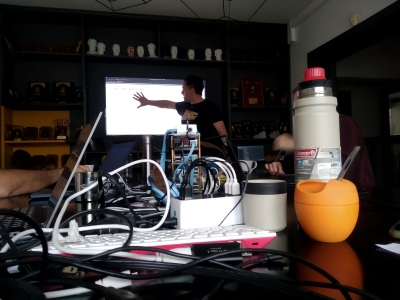
I am happy to say we are also finally also
building Raspberry images for Trixie
(Debian 13, Testing)! Sadly, I managed
to burn my USB-to-serial-console (UART) adaptor, and could neither test those,
nor the oldstable ones we are still building (and will probably soon be dropped,
if not for anything else, to save disk space).
We enjoyed a lot of socialization time. An important highlight of the conference
for me was that we reconnected with a long-lost DD, Eduardo Tr pani, and got him
interested in getting involved in the project again! This second day, another
local Uruguayan, Mauricio, joined us together with his girlfriend,
Alicia, and Felipe came again to hang out with us. Sadly, we didn t get
photographic evidence of them (nor the permission to post it).

The nice house Santiago got for us was very well equipped for a
miniDebConf. There were a couple of rounds of pool played by those that enjoyed
it (I was very happy just to stand around, take some photos and enjoy the
atmosphere and the conversation).
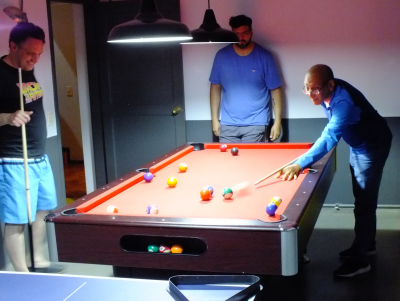



Today (Saturday) is the last full-house day of miniDebConf; tomorrow we will be
leaving the house by noon. It was also a very productive day! We had a long,
important conversation about an important discussion that we are about to
present on
debian-vote@lists.debian.org.
It has been a great couple of days! Sadly, it s coming to an end But this at
least gives me the opportunity (and moral obligation!) to write a long blog
post. And to thank Santiago for organizing this, and Debian, for sponsoring our
trip, stay, foods and healthy enjoyment!
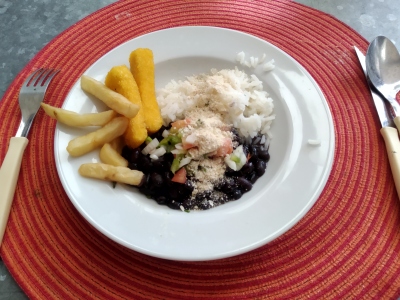
 Last week we held our promised miniDebConf in Santa Fe City, Santa Fe province,
Argentina just across the river from Paran , where I have spent almost six
beautiful months I will never forget.
Last week we held our promised miniDebConf in Santa Fe City, Santa Fe province,
Argentina just across the river from Paran , where I have spent almost six
beautiful months I will never forget.
 Around 500 Kilometers North from Buenos Aires, Santa Fe and Paran are separated
by the beautiful and majestic Paran river, which flows from Brazil, marks the
Eastern border of Paraguay, and continues within Argentina as the heart of the
litoral region of the country, until it merges with the Uruguay river (you
guessed right the river marking the Eastern border of Argentina, first with
Brazil and then with Uruguay), and they become the R o de la Plata.
Around 500 Kilometers North from Buenos Aires, Santa Fe and Paran are separated
by the beautiful and majestic Paran river, which flows from Brazil, marks the
Eastern border of Paraguay, and continues within Argentina as the heart of the
litoral region of the country, until it merges with the Uruguay river (you
guessed right the river marking the Eastern border of Argentina, first with
Brazil and then with Uruguay), and they become the R o de la Plata.
 This was a short miniDebConf: we were lent the APUL union s building for the
weekend (thank you very much!); during Saturday, we had a cycle of talks, and on
sunday we had more of a hacklab logic, having some unstructured time to work
each on their own projects, and to talk and have a good time together.
This was a short miniDebConf: we were lent the APUL union s building for the
weekend (thank you very much!); during Saturday, we had a cycle of talks, and on
sunday we had more of a hacklab logic, having some unstructured time to work
each on their own projects, and to talk and have a good time together.
 We were five Debian people attending:
We were five Debian people attending:
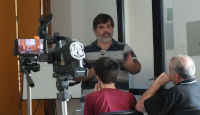 We had the following set of talks (for which there is a promise to get
electronic record, as APUL was kind enough to record them! of course, I will
push them to our usual conference video archiving service as soon as I get them)
We had the following set of talks (for which there is a promise to get
electronic record, as APUL was kind enough to record them! of course, I will
push them to our usual conference video archiving service as soon as I get them)
 15 years, "la ni a bonita", if you ask many of my fellow argentinians, is the amount of time I haven't been present in any Debian-related face to face activity. It was already time to fix that. Thanks to Santiago Ruano Rinc n and
15 years, "la ni a bonita", if you ask many of my fellow argentinians, is the amount of time I haven't been present in any Debian-related face to face activity. It was already time to fix that. Thanks to Santiago Ruano Rinc n and  I took the opportunity to do my first trip by ferry, which is currently one of the best options to get from Buenos Aires to Montevideo, in my case through Colonia. Living ~700km at the south west of Buenos Aires city the trip was long, it included a 10 hours bus, a ferry and yet another bus... but of course, it was worth it.
In Buenos Aires' port I met Emmanuel
I took the opportunity to do my first trip by ferry, which is currently one of the best options to get from Buenos Aires to Montevideo, in my case through Colonia. Living ~700km at the south west of Buenos Aires city the trip was long, it included a 10 hours bus, a ferry and yet another bus... but of course, it was worth it.
In Buenos Aires' port I met Emmanuel 











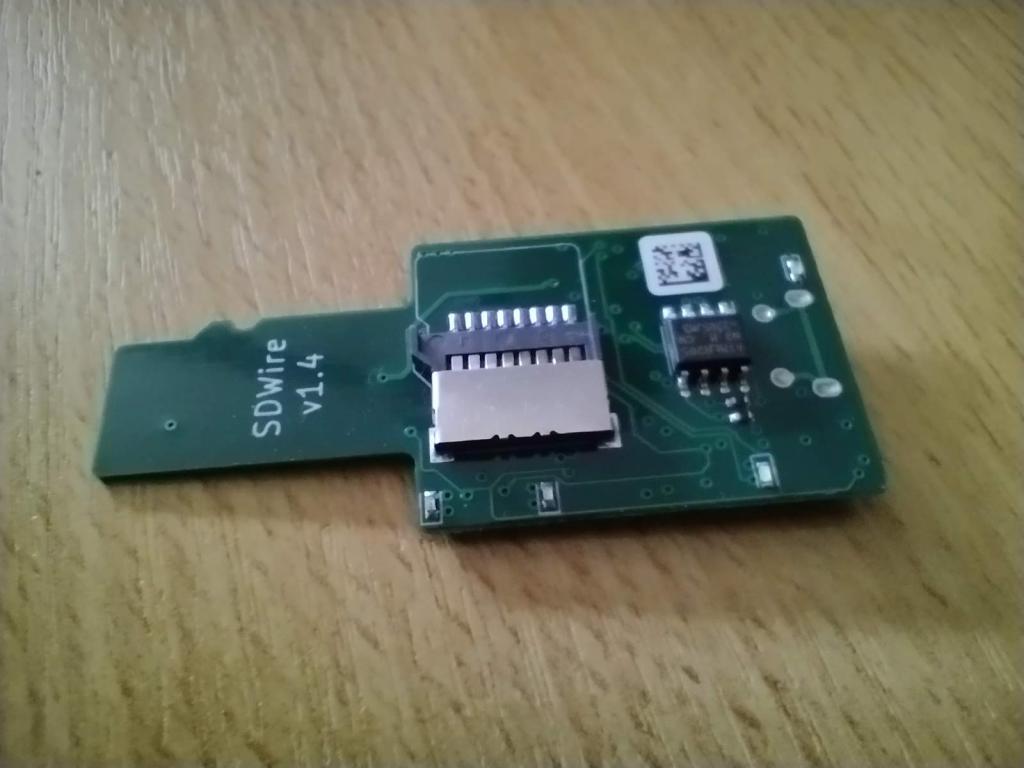
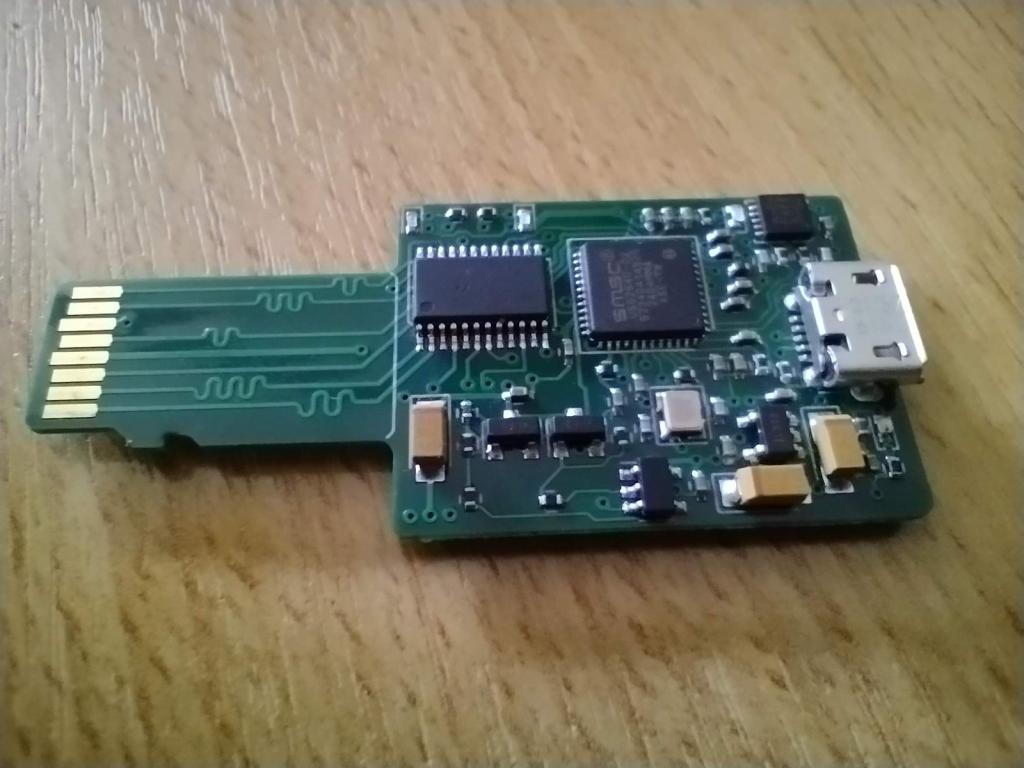 This little gadget is an SD muxer: it allows you to use it as a "normal" card reader or switch the SD card to the SD card slot. So next time I need to copy contents to a SD card and then push it to a board I can just do it from the command line.
Now the software to control this device was not in Debian, so
This little gadget is an SD muxer: it allows you to use it as a "normal" card reader or switch the SD card to the SD card slot. So next time I need to copy contents to a SD card and then push it to a board I can just do it from the command line.
Now the software to control this device was not in Debian, so  Update 2020-10-19: All packages are now available in Debian/experimental!
More than a month has passed since my last KDE/Plasma for Debian update, but things are progressing nicely.
OBS packages
On the OBS side, I have updated the KDE Apps to 20.08.2, and the KDE Frameworks to 5.75. Especially the update of apps brings in at least a critical security fix.
Concerning the soon to be released Plasma 5.20, packages are more or less ready, but as reported
Update 2020-10-19: All packages are now available in Debian/experimental!
More than a month has passed since my last KDE/Plasma for Debian update, but things are progressing nicely.
OBS packages
On the OBS side, I have updated the KDE Apps to 20.08.2, and the KDE Frameworks to 5.75. Especially the update of apps brings in at least a critical security fix.
Concerning the soon to be released Plasma 5.20, packages are more or less ready, but as reported 

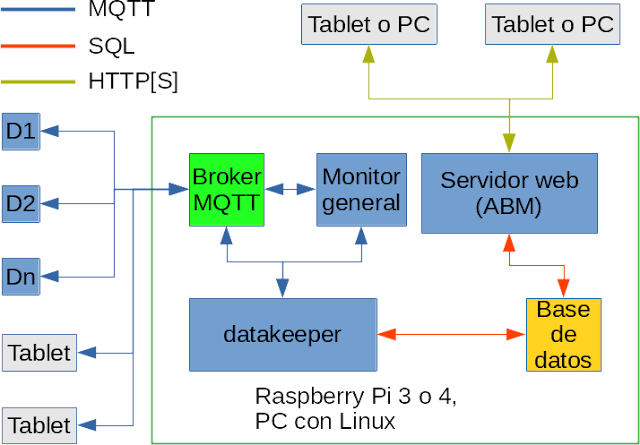


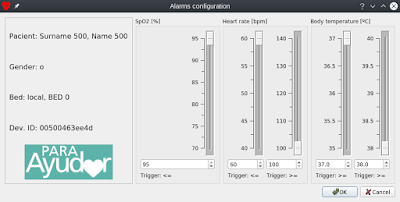
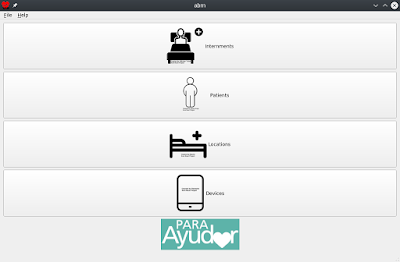

 Before and during FOSDEM 2020, I agreed with the people (developers, supporters, managers) of the UBports Foundation to package the Unity8 Operating Environment for Debian. Since 27th Feb 2020, Unity8 has now become Lomiri.
Recent Uploads to Debian related to Lomiri
Over the past 7-8 weeks the packaging progress has been slowed down due to other projects I am working on in parallel. However, quite a few things have been achieved:
Before and during FOSDEM 2020, I agreed with the people (developers, supporters, managers) of the UBports Foundation to package the Unity8 Operating Environment for Debian. Since 27th Feb 2020, Unity8 has now become Lomiri.
Recent Uploads to Debian related to Lomiri
Over the past 7-8 weeks the packaging progress has been slowed down due to other projects I am working on in parallel. However, quite a few things have been achieved: